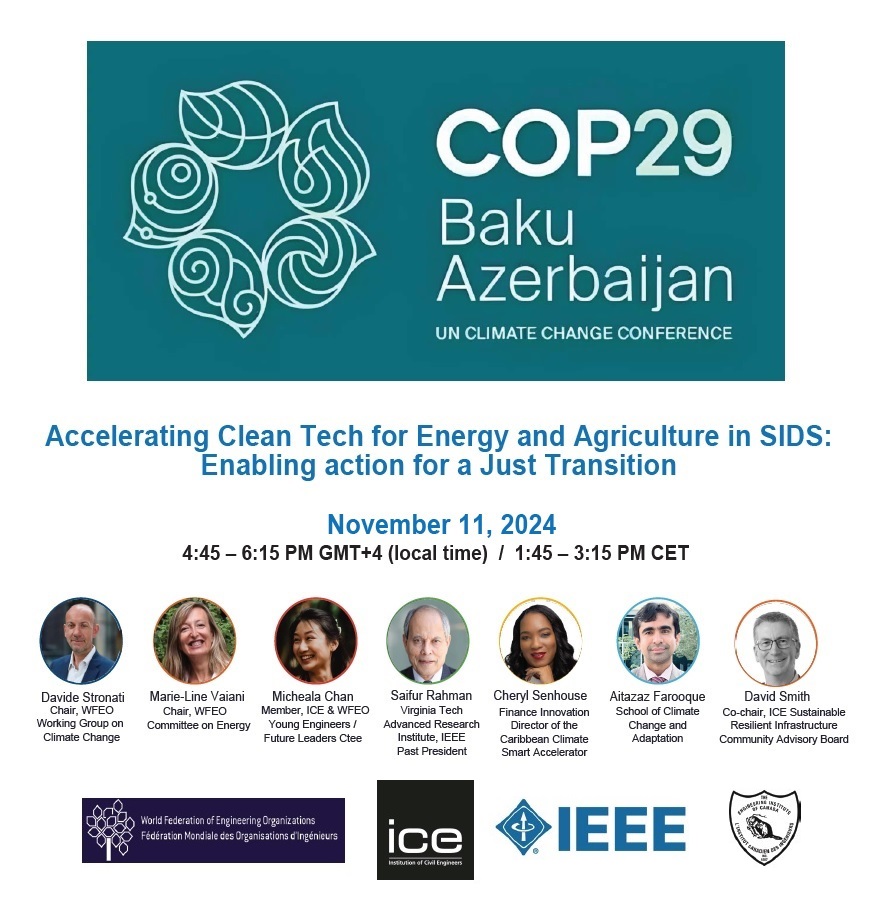
The 2024 United Nations Climate Change Conference or Conference of the Parties of the UNFCCC, more commonly referred to as COP29, was the 29th United Nations Climate Change conference, held from 11 to 22 November 2024, in Baku, Azerbaijan.
The COP29 Presidency’s plan was based on two mutually reinforcing parallel pillars. The first pillar — to “enhance ambition” — combines key elements to ensure all parties commit to ambitious national plans and transparency. The second pillar — to “enable action” — reflects the critical role of finance, a key tool to turn ambition into action and reduce emissions, adapt to climate change and address loss and damage.
WFEO partnered with the Engineering Institute of Canada (EIC), Institute of Electrical and Electronics Engineers (IEEE) and Institution of Civil Engineers (ICE) to develop a joint submission.
The successful side event title was “Accelerating Clean Tech for Energy and Agriculture in Small Island Developing States (SIDS): Enabling action for a Just Transition” and took place on Monday 11 November at 16:45 – 18:15 (local time).
The event focused on:
- Accelerating the deployment of clean tech solutions that enable equitable access to energy and support agricultural processes in small island states; and
- Enabling action by harvesting knowledge of communities and expanding skills through capacity building to support the just transition.
The event was split into four 10 minute presentations by speakers with supporting slides and two additional panellists providing a 5 minute presentation and two Q&A sessions. The event was moderated by Davide Stronati, Chair of the WFEO Climate Change and Engineering Working Group.
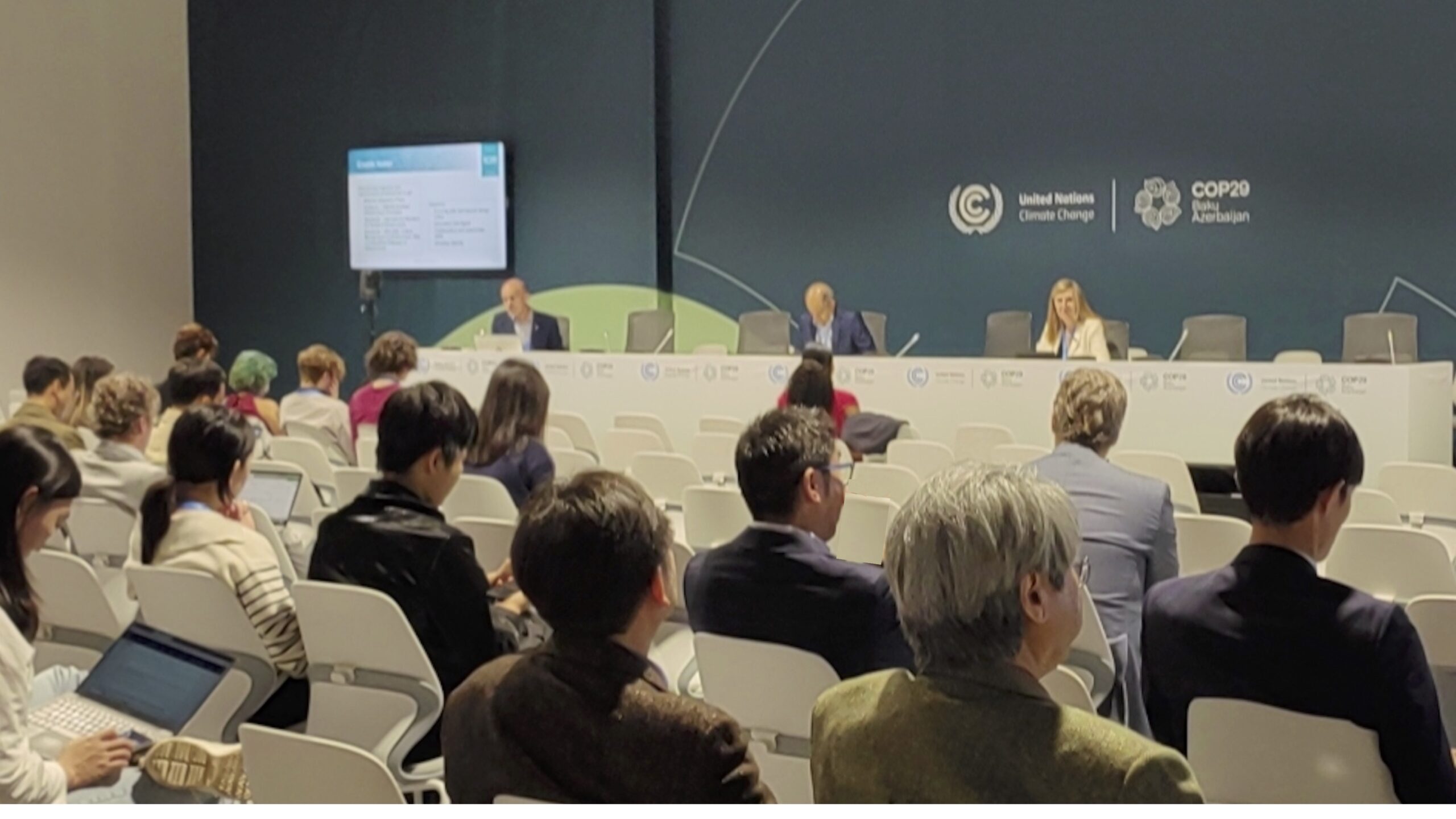
Davide Stronati, Saifur Rahman and Marie-Line Vaiani presenting in-person during the side event
Speakers:
- Saifur Rahman, Founding Director, Advanced Research Institute at Virginia Tech, USA and past IEEE President (2023)
IEEE representative Professor Saifur Rahman spoke about similar work his institution was doing to foster resilience including the sharing and thought leadership through their IEEE Climate Change Collection (ICCC) platform to engage and mobilize its 460,000+ members.
- Dr. Aitazaz A. Farooque, Professor & Associate Dean, Canadian Centre for Climate Change and Adaptation, University of Prince Edward Island
EIC representative Dr. Aitazaz A. Farooque spoke about the trialing of climate smart agriculture practices on Prince Edward Island, Canada as a way to enhance food security and build resilience for the small island communities living there.
Farooque gave an overview of emerging technologies used on Prince Edward Island such as advanced modeling tools used to locate infected crops and soil management zones as well as measure greenhouse gas emissions.
Closing his presentation Farooque noted that collaboration is key to building resilient communities, he said ‘we need to work with islanders and farmers to develop the technology which is useful for them’.
- Marie-Line Vaiani, WFEO Committee on Energy Chair
WFEO representative Marie-Line Vaiani spoke about the challenges facing small island states which it comes creating resilient energy networks. Despite their diversity in culture, geography, and economic development, they face critical challenges.
She said, ‘small island states are on the frontline of climate change’, they only represent 1% of greenhouse gas emissions and but face the most disastrous effects of climate change’. She said that it is imperative that we address the challenges they face such as their reliance on imported fossil fuels and other difficulties including electrification due to their isolated nature.
- David Smith, Independent Consultant and Chair of the ICE Community Advisory Board on Sustainable, Resilient Infrastructure
ICE representative David Smith spoke about ICE’s Sustainable Resilient Infrastructure Community Advisory Board (CAB) and how this programme works in line with the institutions goals to build resilience and mitigate the effects of climate change, in line with UNSDG 13.
Speaking about the work of the Sustainable Resilient Infrastructure CAB Smith said ‘we want decarbonisation and resilience to be core to engineering and infrastructure professions and automatic on infrastructure projects’. This means supporting the development coherent guidance for engineering and championing resilient case studies.
The work done by ICE CAB’s on enabling action through the development of existing Publicly Available Specifications such as PAS 2080, the global standard for managing carbon in buildings and infrastructure as well as forthcoming standards such as Adaptation Pathways for infrastructure provide critical guidance for civil engineers.
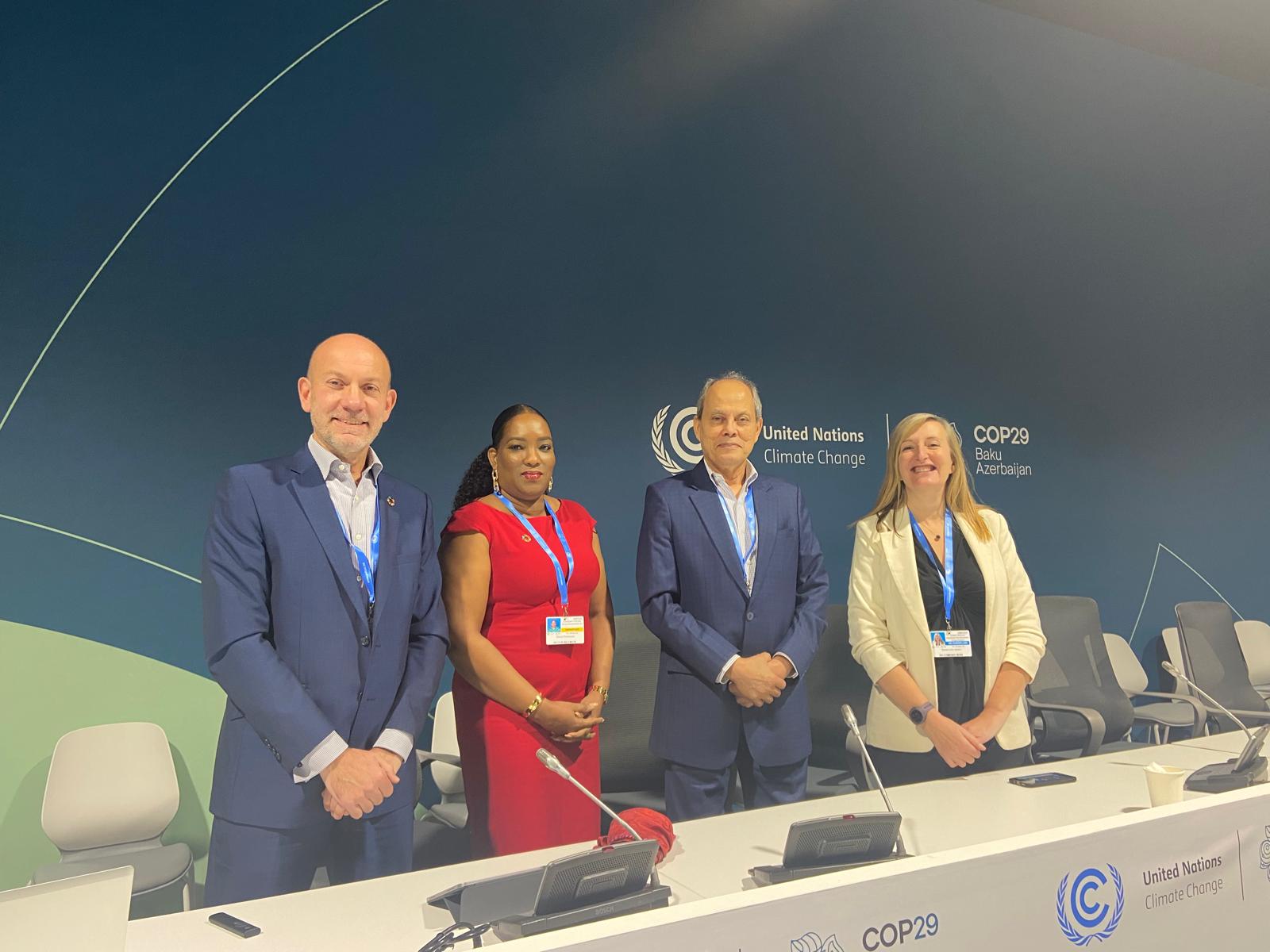
Davide Stronati, Cheryl Senhouse, Saifur Rahman and Marie-Line Vaiani following the side-event presentations
Panel presentations:
- Cheryl Senhouse, Finance Innovation Director of the Caribbean Climate Smart Accelerator
Senhouse discussed the results of a climate smart agriculture pilot scheme located across multiple Caribbean countries using climate smart indoor vertical farming units. She said the objective of the project was to work with schools, in particular the youth, and implement these technologies to ‘to transfer knowledge and increase job security’ within these vulnerable communities.
The vertical farming units take up less than ten square feet of space and produce up to 394 pounds of food annually. It moves away from traditional approaches to agriculture, promoting self-sufficiency as well as community resilience.
- Micheala Chan, Young Water Utilities Expert for the Pacific at Asian Development Bank and member of the WFEO Young Engineers and Future Leaders (YE/FL) SDG 13 Working Group and ICE member
Chan spoke about the role of water’s relationship to climate resilience in the Pacific region. She said that over last 50 years in Asia and the Pacific ‘natural hazards in relation to water have affected 6.9 billion people’ where water related stresses such extreme events sea level rise and are impacting upon communities and economies.
Chan explained that mainstreaming financial investment in climate adaptation has a significant role to play in mitigating the worst effects of climate change for vulnerable communities. The Asian Development Bank have produced an investment framework with integrated and inclusive planning that focuses on long term outcomes for vulnerable communities’.
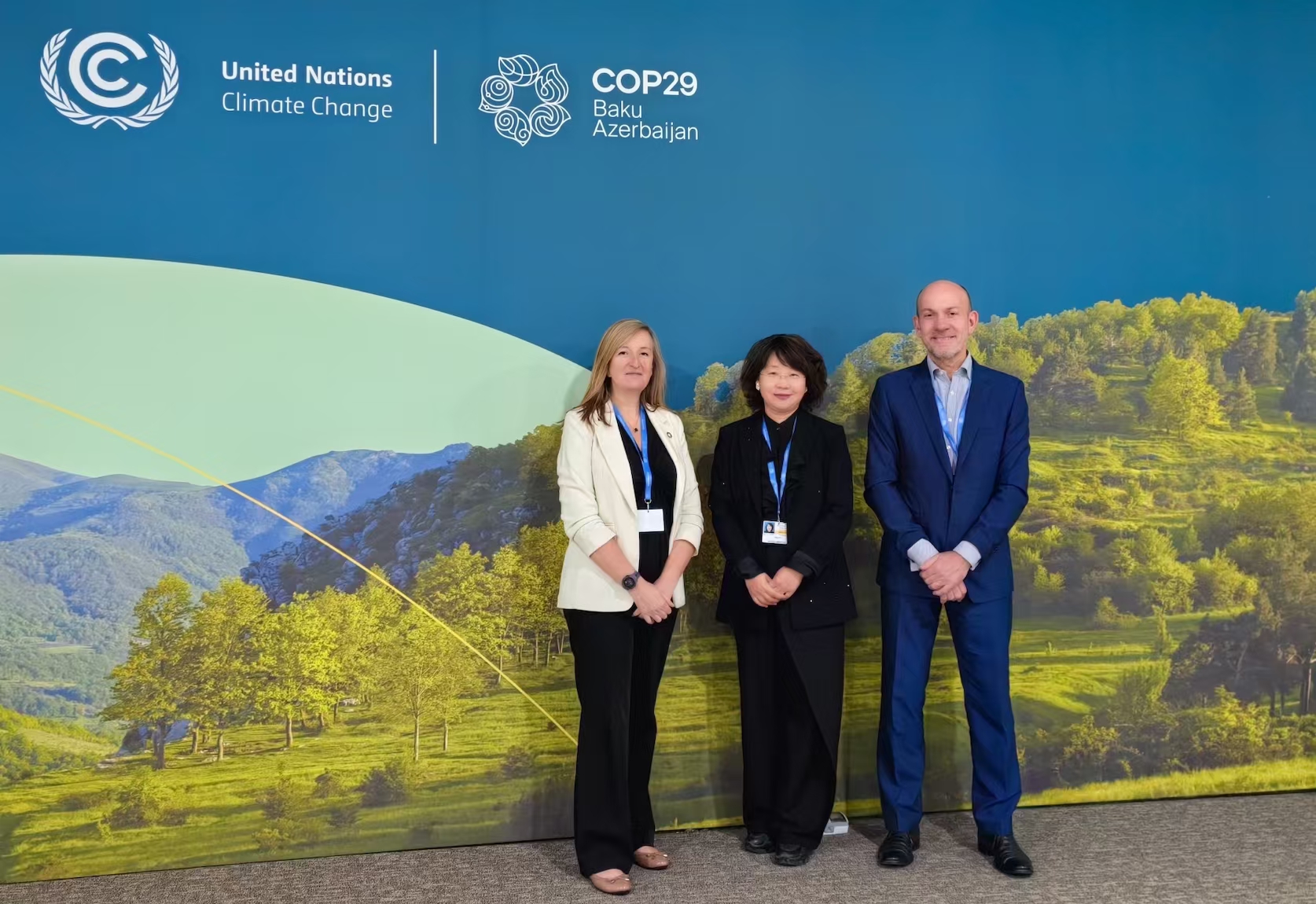
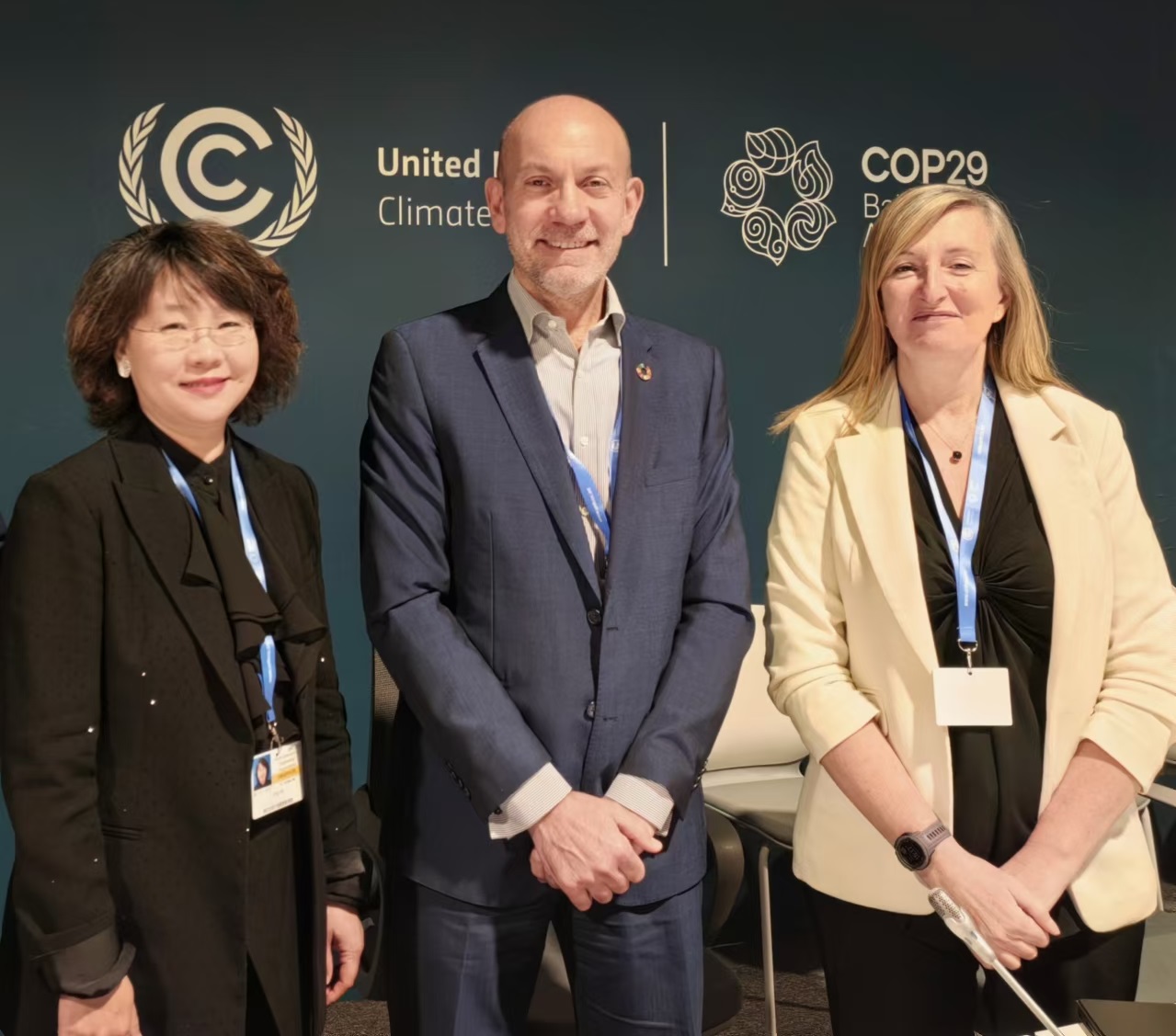
Davide Stronati, Marie-Line Vaiani and Dr. Jing He at the Blue Zone at COP29
Report by Ms. Billie Donovan, climate knowledge specialist at the Institution of Civil Engineers
For more information:
WFEO Working Group on Engineering and Climate Change website
WFEO Committee on Energy website
Institution of Civil Engineers (ICE) website
Engineering Institute of Canada (EIC) website
Institute of Electrical and Electronics Engineers (IEEE) website
NOV
2024
